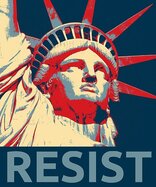Sacred Chickens
Menu
SACRED CHICKENS
 Politics and literature are undeniably intertwined, and always will be. Today, Jarad is sharing his thoughts on their connection, and their role in protest. He asks the question, "If you don’t like or agree with a particular piece of literature, you don’t have to read it, and ideas that challenge your beliefs and ideologies are in fact a good thing. If your truth can’t handle any dissent, is it true?" Since January of 2016, we seem to be in a constant state of political uproar. It has been exhausting but necessary. This is not the first time, nor will it be the last. Resistance to ideologies that you find abhorrent is always a part of politics, and arguably everyday life, but I can’t remember a time quite like this. Granted, I’m young, but it’s still jarring to see such events occurring in 2019, and to lose friends over politics. People are polarized, and some lament this fact and worry about a society that cannot abide differing opinions. On the other hand, sometimes there’s good reason for that. For example, in the case of the recent resurgence of Neo-Nazism, there’s no in between on that issue. You either abide them or you don’t. There are times when choices become stark. So, it can’t be denied that recent events have prompted more engagement with politics, but as an English major, I can’t help but look to literature and poetry for help sorting out the world. In some ways, literature may add to the recent polarization. The most obvious example is that every politician is now writing a book, Senator Warren, Bernie Sanders, and Hillary Clinton come to mind, but haven’t they always? Certainly, politicians have been writing books for some time, but the difference is that they’re getting more attention now than previously. This could be, of course, because politics itself is getting more attention than previously; regardless, there is definitely more consideration being paid to these books. More than just a way to gain attention and spread viewpoints, literature has always been a way to parse current events and the philosophy behind them. Because of this, literature and rebellion have always gone hand in hand, because authors use the medium to say things that they could not otherwise, sometimes because it’s easier to tell the truth through fiction, and sometimes because the message had to be disguised for the safety of everyone involved. Even though most books have underlying messages, much like parables, some are more direct than others. For example, before the internet and television existed, people got their information through literature. That was the main source of information. Furthermore, in the late 1980s and early 90s, Vaclav Havel emerged in Prague as a dissident during a time of political upset, and he played a major role in the Velvet Revolution that toppled communism in that country. He did this, before he became president, by writing plays that with an absurdist style of writing that criticized Communism. Similarly, during the Civil Rights Movement, authors like James Baldwin, Richard Wright, Ralph Ellison and Gwendolyn Brooks wrote books and poetry describing what it was like to black in America at that time, and the injustice and inequality that was so prevalent, and is still so prevalent. Literature as a form of rebellion is perhaps best illustrated by the White Rose, a nonviolent, intellectual group that operated in Nazi Germany. Throughout their year of operation, they waged an anonymous leaflet and graffiti campaign that called for active and passive resistance to the Nazi Regime, distributing around 15,000 copies. Interestingly, out of the first 100 pamphlets distributed, 35 were turned over to the Gestapo. According to the Holocaust Research Project, “Between June 1942 and February 1943, they prepared and distributed six different leaflets, in which they called for the active opposition of the German people to Nazi oppression and tyranny.” Tragically, three core members of the White Rose were executed on February 22, 1943, as was the professor who had guided the movement. However, the way in which the students were able to successfully distribute so much of their ideology demonstrates the power literature has and will always have, even in times of great oppression. This reminds me of a quote from Neil Postman which reads, “The written word endures.” Literature, as a concept and as an art form, endures as well. Some people naively try to say that literature and art shouldn’t be mixed up in politics. This is impossible. Even seemingly innocuous books meant for children will have an effect in the real and very political world we live in. Harry Potter was banned and burned in masse by some religious organizations because of the magical element the books have, and hundreds of books each year are challenged for similar reasons. What these challengers fail to realize is that if you don’t like or agree with a particular piece of literature, you don’t have to read it, and ideas that challenge your beliefs and ideologies are in fact a good thing. If your truth can’t handle any dissent, is it true? One of the first cases in the US was the banning of Darwin’s On the Origin of Species in the mid-nineteenth century. From a legal perspective, the courts in the U.S generally side with literature, as with the court case Evans v. Selma Union High School District of Fresno County, which challenged the inclusion of the King James Bible in a high school library, because of course the religious is often political, and was seen by the California Supreme Court, which ruled that, “ The mere act of purchasing a book to be added to the school library does not carry with it any implication of the adoption of the theory or dogma contained therein, or any approval of the book itself, except as a work of literature fit to be included in a reference library." I love this ruling because it not only rejects the idea of banning any book, but also because it defines libraries for what they are: unbiased warehouses of knowledge that are not beholden to the prejudices or religious beliefs of the people that use them. “The personal is political,” was the slogan of the Second Wave Feminist Movement. This applies to everything in our lives, including literature. Politics has always influenced literature, and literature has always commented and sometimes rebelled against it. As was the case with the White Rose and the Velvet Revolution, literature can be a means of spreading dissent. Now, we see an influx of books and the messages they contain from politicians gaining national attention and poetry being written as a means of protesting against the current administration. Whatever the creative outlet, people use it to voice their opinions, as they should. But to say that certain outlets should be exempt from the political is naïve, because no aspect of our day-to-day lives is exempt, however hard some of us try to ignore it.  Bio Jarad is the co-administrator and writer for Sacred Chickens, attends college at MTSU, loves tea and coffee, and tries to spend every spare second reading. He recently developed an interest (some might say obsession) with gardening. Jarad is an English major with a concentration in literature. Bless his heart! Let's all light a candle for him and send him happy thoughts!
0 Comments
Leave a Reply. |

Click Photo above to buy ebook or paperback from Amazon.
Here's the link to Barnes and Noble Or order through your favorite independent bookstore! Categories
All
|
 RSS Feed
RSS Feed